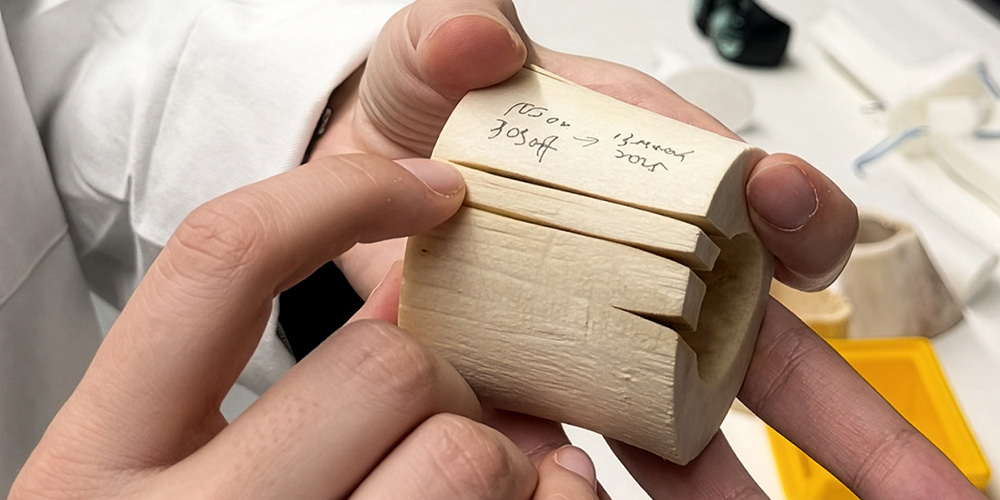Bernoulli lecture: How passion and perseverance determine our success
Why are some people more successful than others? According to American psychologist Angela Duckworth, it takes a special blend of passion and perseverance which may be more important that talent and intellect in fueling success. On October 24, Angela Duckworth will give this year's Bernoulli Lecture for the Behavioral Sciences. Uni News spoke to her in advance.
14 October 2019
Psychologist Angela Duckworth uses science to understand how and when people achieve their goals. Some of her work became popularized and internationally known with her New York Times bestseller GRIT: The power of passion and perseverance. In addition to grit, Angela studies self-control and character development.
Ms. Duckworth, your book focuses on the thesis that success is not primarily based on talent or IQ, but on grit. What exactly is grit?
Grit is passion and perseverance for long-term goals. Grit is about having what some researchers call an”ultimate concern” – a goal you care about so much that it organizes and gives meaning to almost everything you do. And grit is holding steadfast to that goal. Even when you fall down. Even when you screw up. Even when progress toward that goal is halting or slow. Talent and luck matter to success. But talent and luck are no guarantee of grit. And in the very long run, I think grit may matter as least as much, if not more. This is also what research suggests.
Translating grit into German is a challenge. There is no single word that would equally capture the idea of grit, but more like a range of terms such as “Leidenschaft”, “Ausdauer” oder “Beharrlichkeit.”
Yes, grit is a unique blend of character and not every language has an equivalent. There is a Japanese proverb that I like very much because it`s a great description of the essence of grit: “Fall seven, rise eight.“
So gritty people don`t quit. But elsewhere you have said that kids, for example, should quit. Isn`t that a contradiction?
Not necessarily. Early in life, you don`t know what you want to do. Take myself as an example, it took me until I was 32 to really figure out that I wanted to be a psychologist – a psychologist who would help improve the lives of kids. So what was I doing before I was 32? I was quitting things. I was quitting being a speech writing intern at the white house. I was quitting my job as a consultant. I was quitting being a teacher in the classroom. Importantly, in that quitting, I was very intently trying to find something. It wasn`t just quitting for quitting`s sake, but quitting so I could find something that I could be loyal to for the rest of my life. And I finally did find that. Before specialization comes sampling.
Is grit in our DNA?
As for all other personality traits, genes and environment both influence the development of grit. The aspect that I am most interested in, of course, is the non-DNA part. I am focusing on the question of how parents, teachers, and other role models as well as our immediate social environment – including employers – can positively influence the growth of grit.
Can you be too gritty?
I don`t worry too much about a person having too much grit, but I do worry about people having grit without other strengths, such as honesty, integrity, kindness, compassion, creativity, curiosity or gratitude. Research suggests that thriving depends on developing what Aristotle called “character”: collectively, the diverse strengths of heart, mind, and will that enable people to make the most of their relationships, their goals and dreams, and their ideas and imagination. It is precisely this kind of character development that Character Lab is devoted to.
How can you find happiness in a life that is also a life of striving?
The key is to find satisfaction in small victories. People working on big things are very good at dividing up those things in small parts, and this is where the gratification comes from. I think it`s less in the Gold medal or Nobel Prize and more in the journey – in these tiny situations, where you take a step forward rather than in the feeling “and now I have arrived.” I never want to feel like I have arrived.
Strategic Self-Control. Bernoulli Lecture for the Behavioral Sciences by Prof. Dr. Angela Duckworth. Thursday, 24 Oktober 2019, 6.15–7.45 pm, Bernoullianum, Large lecture hall, Bernoullistrasse 30, Basel. iCal
Bernoulli Lectures
The Bernoulli Lectures for the Behavioral Sciences honor researchers who have contributed significantly to the development of the behavioral sciences, particularly in the fields of Psychology and Economics. The Bernoulli lectures are organized yearly by the Bernoulli Network for the Behavioral Sciences, a joint initiative of the Faculty of Psychology and the Faculty of Business and Economics of the University of Basel, with the aim of fostering interdisciplinary dialogue in the behavioral sciences. The initiative honors the polymath Daniel Bernoulli (1700-1782), who contributed greatly to conceptions of utility and risk that are central to Psychology, Economics, and related disciplines.


